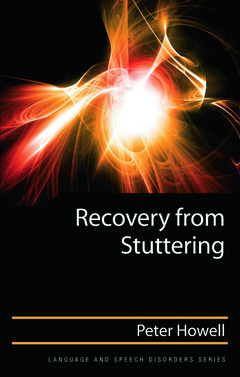Description
Recovery from Stuttering
Language and Speech Disorders Series
Author: Howell Peter
Language: English
Subject for Recovery from Stuttering:
Keywords
Developmental Stuttering; part; Covert Repair Hypothesis; word; Part-word Repetitions; repetitions; Stuttering Rate; onset; Stuttering Symptoms; symptoms; Fluent Speakers; fluent; Speech Language Pathologists; speakers; Stuttering Onset; rate; Persistent Stuttering; delayed; Covert Repair; auditory; Function Words; Fluent Controls; Van Lieshout; Content Words; Efferent Copy; De Nil; Auditory Feedback; Normal Nonfluency; DAF; Motor Timing; Phrase Repetitions; Vice Versa; Single Syllable Word Repetitions; Speech Errors; Minnesota Multiphasic Personality Inventory
Publication date: 12-2010
Support: Print on demand
Publication date: 01-2016
· 15.2x22.9 cm · Paperback
Description
/li>Contents
/li>Biography
/li>
This book is a comprehensive guide to the evidence, theories, and practical issues associated with recovery from stuttering in early childhood and into adolescence. It examines evidence that stuttering is associated with a range of biological factors ? such as genetics ? and psychological factors ? such as anxiety ? and it critically assesses theoretical accounts that attempt to integrate these findings. Written so that it can be used flexibly to meet the demands of courses about stuttering, the book may be used as a text at the undergraduate or graduate level in psychology or speech-language science.
Part 1. General Aspects of Developmental Stuttering. 1. Definitions, Stuttering Severity, and Categorization Instruments. 2. Epidemiology. 3. Symptomatology. Part 2. Factors Related to Developmental Stuttering Based on Experimental Studies. 4. Genetic Factors and Their Impact on Onset and Recovery of Stuttering. 5. CNS Factors in Investigations into Persistent and Recovered Stuttering. 6. Cognitive Factors. 7. Language Factors. 8. Motor Factors. 9. Environmental, Personality, and Emotional Factors. Part 3. Theoretical Frameworks on Developmental Stuttering. 10. Models that Attribute Stuttering to Language Factors Alone. 11. Theories that Explain Why Altered Feedback Improves the Speech Control of Speakers Who Stutter and General Theories of Speech Production that Include Accounts of Stuttering. 12. Model that Proposes an Interaction Between Language and Motor Factors: EXPLAN. Part 4. Practical Issues in Developmental Stuttering. 13. Early Diagnosis of Stuttering and Its Prognosis to Teenage and Beyond. 14. Subtyping. 15. Application to Treatment and General Issues About Recovery.
These books may interest you

Theoretical Issues in Stuttering 88.32 €

Theoretical Issues in Stuttering 209.69 €


